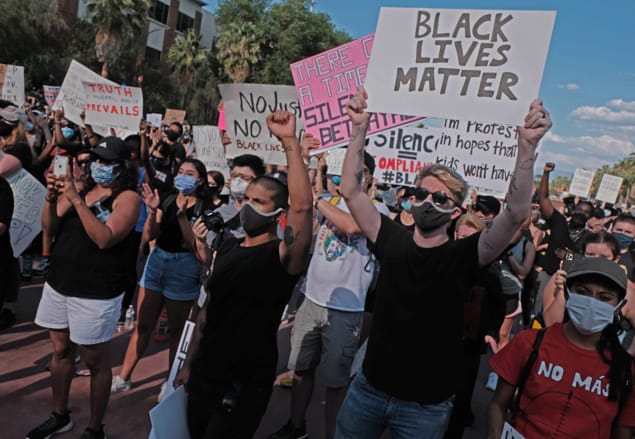
US scientific societies, universities and technology companies have reacted strongly to the death of African American George Floyd, who was killed on 25 May by a Minneapolis policeman. Responding to Floyd’s death and other African Americans who have died at the hands of police, science-based organizations have condemned injustice, systemic racism and lack of opportunity for minority members in science and the broader community. Yet some have criticized the society statements as coming too little, too late, and without the support of positive action to counter the abuses.
Floyd was arrested on 25 May suspected of carrying a counterfeit $20 bill. Handcuffed and lying face down on the street, a police officer pressed his knee to Floyd’s neck for almost nine minutes, killing him in the process. Following the death, protests and demonstrations were held across the US against systemic racism, excessive use of police force and lack of accountability for police officers.
Racism persists because many of us have refused to see it
Megan Donahue
In a letter to the membership of the National Society of Black Physicists (NSBP), president and Brown University physicist Stephon Alexander noted that racism “poisons law enforcement and can poison the scientific enterprise”. Alexander added that the loss of innocent lives “at the hand of those who are supposed to protect lives deepens our fear and isolation” and encouraged donations to the NSBP, which has supported black physics students and professionals for four decades.
Among the scientific organizations to have added their voice in support of the black community is the American Physical Society (APS). It said in a statement that while systemic racism and racial injustice persist around the world, it was “especially concerned for colleagues of colour and their families”.
APS’s current president-elect and former NSBP president James Gates told Physics World that the society felt it important to issue a statement because “the attitudes are as toxic to democracy and science as poison to a body”. He added that the APS values diversity, equity, inclusion, and respect and that they will work “to take actions that support these values”.
Taking action
However, Fermilab and University of Chicago astrophysicist Brian Nord questioned the APS’s response. “On what planet does APS think that it has convinced Black people of any commitment to justice,” he said on Twitter. “Will there be a letter discussing any real action? No suggestions about concrete things people can do right now?” he asked in other Tweets.
Some admit that the scientific community must take some responsibility for continuing racial problems. “Racism persists because many of us have refused to see it,” astrophysicist Megan Donahue from Michigan State University, who is also president of the American Astronomical Society, said in a statement. “Dispersed across the world, many of us isolated at home, we can barely comprehend the tragedies unfolding across the country and the world, but we know that the trauma of these tragedies will be felt most acutely by the marginalized.”
Several organizations have, however, begun specific efforts to help remedy the situation. The American Meteorological Society, for example, has created a “culture and inclusion cabinet”. AMS president Mary Glackin, who is also a vice-president of The Weather Company, noted in a statement that the society “acknowledges the pain our Black and African American community members are experiencing and hope our solidarity relieves a part of the weight of that path”. Sudip Parikh, chief executive of the American Association for the Advancement of Science, meanwhile, has called for the association to “recommit to systemic change and such relevant principles as ensuring diversity, equity and inclusion”.

Why we need to keep talking about equality in physics
Universities and companies have also joined in the calls to change. Cornell University president Martha Pollack says that her university will “address this scourge of racism directly in our educational programmes, in our research and in our engagement and related activities”. Meanwhile, medical-device company Boston Scientific has pledged to “increase talks with employee resource groups around the world and ask employees to act when they experience or witness intolerance, mistreatment or bias”.
Scientists have also started to promote their own ideas. Sarafina Nance, a graduate student in theoretical astrophysics at the University of California, Berkeley, has compiled some anti-racism resources. And in an article in Forbes, astrophysicist and science writer Ethan Siegel suggests steps that academics can take to “play a major role in transforming science and academia into a safer, more inclusive environment.” Those include recognizing that black students face challenges beyond those that other students face; actively creating a welcoming, supportive environment; and learning how to be inclusive oneself rather than putting the onus on black colleagues.



